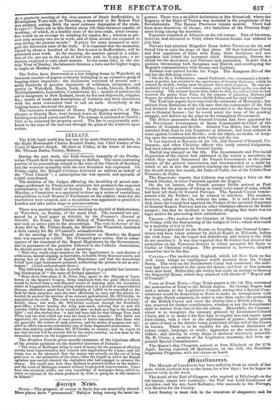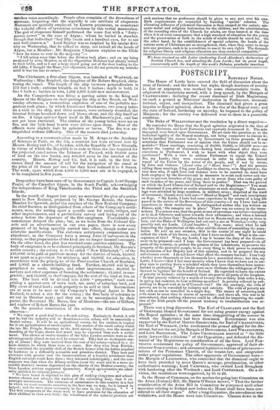irtiscelIanto US.
The Marquis of Lansdowne has been suffering from an attack of the gout, which confined him to the house for a few days ; but he began to recover early in the week.
The death of the Earl of Glasgow, who expired at Edinburgh on the 6th instant, causes two vacancies : the Earl was Lord-Lieutenant of Ayrshire ; and his son, Lord Kelburne, who succeeds to the Peerage, was Member for the County.
Lord Stanley is most rich in the resources of eloquence; and he catches votes accordingly. People often complain of the drowsiness of sermons, forgetting that the soporific is one attribute of eloquence. Narrators are specially employ ed by Eastern potentates, to counteract the wakeful effects of tyrannous conscience by this verbal mesmerism. The god of eloquence himself performed the same feat with a " forty- parson power " in the case of Argus ; • whom he buried in slumber, though that individual "had fifty heads and a hundred eyes, for to see and well discern-a." Lord Stanley was so inspired by his tutelar divi- nity on Wednesday, that he talked to sleep, not indeed all the heads of Argus, but a Member : Mr. Benjamin Chapman explains to the Globe "how he came to vote in the majority "- " I fell asleep some time before the division took place; and on my being awakened by some Member, as all the Opposition Members bad already retired to their lobby, and as I saw a large crowd going out of the door leading to the old lobby, I thought the House had adjourned, and did not perceive my mistake until it was too late to return."
The Chichester, a first-class frigate, was launched at Woolwich, on Wednesday ; Miss Stopford, the daughter of Sir Robert Stopford, chris- tening the vessel. The length of the ship between perpendiculars is 173 feet 1 inch ; extreme breadth, 44 feet 9 inches ; depth in hold, 14 feet 6 inches ; burden in tons, 1,002 2,969 3,500 new measurement.
As the Camperdown was firing a parting salute to the King and Queen of the Belgians on their passing the ship at Sea Reach, on Wed- nesday afternoon, a tremendous explosion of one of the portable ma- gazines took place ; by which Lieutenant Blackmore, two young ladies on a visit to the ship, and three seamen, were seriously wounded, the internal fittings kcocked down and blown about, and the ship itself set on fire. A large splinter fixed itself in Mr. Blackmore's jaw, and has not yet been extracted. The clothes of the young ladies were set on fire, and the bulk-head boards were driven upon them. Most of the officers were slightly hurt by splinters or burns. The fire was ex- tinguished without difficulty. One of the seamen died yesterday.
According to a communication made by M. Arago to the Academy of Sciences at Paris, on the 5th, a contract has been en'ered into by Messrs. Baring and Co., of London, with the Republic of New Grenada, in virtue of which the Republic is to cede to them the line required for the projected canal across the Isthmus of Panama, with 80,000 acres of land on the two banks, and 400,000 acres in the interior of the country. Messrs. Baring and Co. had, it is said, in the first in- stance fixed the amount of toll for the navigation of the canal at the price of 18 francs per ton ; but they have reduced it to 8 francs. The work, upon which from 4,000 to 5,000 men are to be engaged, is to be completed in five years.
Despatches have been sent off by Government to Captain Lord George Paulet, of the Carysfort frigate, in the South Pacific, acknowledging the independence of King Tamehameha the Third and the Sandwich Islands.
In the month of August last year, we mentioned the plan of a settle- ment in New Zealand, projected by Mr. George Rennie, the former Member for Ipswich, under the auspices of the New Zealand Company. Its chief features, as distinguished from others of the Company's settle- ments, were, the setting apart a specific sum for roads, bridges, and other improvements, and a preliminary survey and laying out of the colony before the departure of the first emigrants. Unavoidable cir- cumstances delayed the plan ; but, as we learn from the Colonial Ga- zette and an advertisement in our own pages, there is now every prospect of its being speedily carried into effect, though under con- siderable modifications. The elaborate anticipatory preparations are abandoned, as the Company have a strong force of surveyors in the colony, so that preparations of the kind are no longer deemed necessary. On the other hand, the plan has received some positive additions. The body of emigrants is to be collected principally in Scotland, Mr. Rennie's native country ; the colony is to be called " New Edinburgh" ; of the 216,0001. to be paid as purchase-money for the district of lands, 10,0001. is set apart as a provision for ministers, and 10,000/. for education, in accordance with the principles of the Presbyterian Church of Scotland, and 5,0001. as a church-building fund. Further, 26,0001. will be ap- propriated to roads, bridges, and other improvements ; 30,0001. to surveys and other expenses of founding the settlement ; 81,0001. to emi- gration ; and 54,0001. to the Company, for the cost of the land at 10.9. an acre. The land will be divided into 2,000 " properties," each com- prising a quarter-acre of town land, ten acres of suburban land, and
fifty acres of rural land ; each property to be sold at 1201. Instructions are at once to be sent to the Company's Principal Agent in New
Zealand, to select a site for the colony ; the first body of colonists to set out in October next ; and they are to be accompanied by their pastor, the Reverend Mr. Burns, late of Monkton—the son of Gilbert, and nephew of Robert Burns the poet. On the peculiar constitution of the colony, the Colonial Gazette observes- " We expect a good deal from a Scotch colony. Exclusively Scotch it will not be, but the majority will be Scotchmen—the colony will be essentially a Scotch colony. It will be an agricultural colony, for the settlers in request for it are agriculturists of small capital. The success of the small colony which the late Mr. Pringle, Secretary to the Anti-slavery Society, was the means of founding at the Cape, shows how much may be expected from such a settle- ment. The eleven or twelve families of the Glen Lynden settlers were as dis- advantageously placed as can well be conceived. They had an inadequate sup- ply of labour ; they were isolated from the rest of the colony—placed in a re- mote district, to which there were no roads. But they were from Ettrick ; they combined the-scientific skill of the Scotch farmer with the habits acquired by residence in a difficultly accessible and primitive district. They bore and overcame with greater ease the inconveniences of a frontier settlement than English colonists could have done ; they laboured indefatigably ; and the con- sequence was that when the Albany settlers (near the coast and in a more ac- cessible district) became dependent on the charity of the Mother-country, the Glen Lynden settlers supported themselves. Scotch agriculturists are admi-
rably qualified for colonial pioneers. • •
" We have heard it objected to this plan of making clergymen and school- master, church and schools, the nucleus of the colonizing body, that it en- courages sectarianism. The existence of sectarianism in this country is a fact to which we must reconcile ourselves is the best way we may, for it cannot be helped ; and the same must necessarily be the case in the Colonies. * • • The first conquerors of the waste wish to have provision for the education of each anxious that no preference should be given to any sect over his own. Both requirements are reconciled by founding ' special' colonies. The alienating influence of polemical discussion is thus escaped at the outset; ade- quate moral and religious instruction for the children, and the administration of the consoling rites of the Church for adults, arc thus insured at the time when it is of most consequence that a high standard of education for the young and the preservation of faith in the minds of adults should be cared for. On the other hand, by the establishment of special colonies, the hands of the various sects of Christians are so strengthened, that, when they come to merge into one province, each is in a condition to assert its own rights. The demands for religious liberty and religious education are thus rendered compatible."



























 Previous page
Previous page